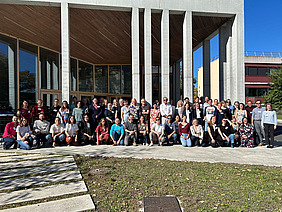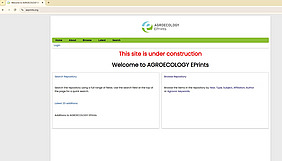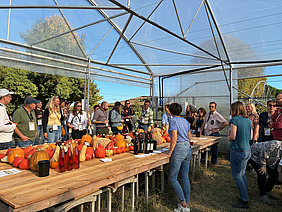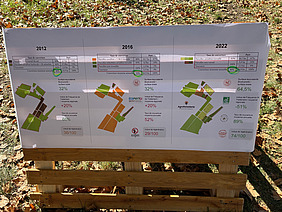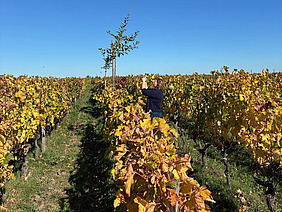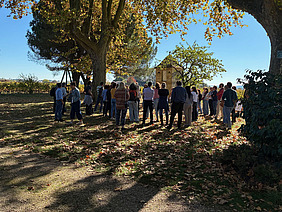A living lab is an experimental space where practitioners, researchers, businesses, policymakers, and society collaborate to develop, test, and evaluate new solutions. The focus lies on participation, interdisciplinarity, and close links to practice.
Since 2024, living labs and research infrastructures in agroecology have been connected through a European network that facilitates regular exchange. FiBL, with its on-farm trial network, is one of currently 55 members of this network, coordinated by the Hungarian Research Institute of Organic Agriculture (ÖMKi).
The host of this year's network meeting was the INRAE-ETTIS research centre, part of the French National Institute for Agricultural Research (INRAE). The gathering primarily served to exchange ideas within the Agroecology Partnership's network. Discussions focused on recent developments in the network, strategies to improve visibility, as well as structures for collaboration and decision-making. Working groups explored joint processes, and additional perspectives were provided by partners from Agriculture and Agri-Food Canada.
Knowledge and Exchange Platform
A key focus of the meeting was the presentation of the planned Collaborative Knowledge Platform of the network, which is being developed in three main components:
- Agroecology EPrints Repository (www.aeprints.org) modelled on the Organic Eprints archive of the Danish ICROFS and developed with support from FiBL. It will serve as an open-access collection of agroecology resources.
- Knowledge dissemination and translation by FiBL, which will prepare practice-oriented and user-friendly content from the repository, similar to its role in the Organic Farm Knowledge platform (www.organic-farmknowledge.org)
- Collaborative Platform, a digital space for networking, co-creation, and long-term cooperation. It will be managed by LifeWatch ERIC, a European research infrastructure based in Spain that provides digital tools and data platforms for biodiversity and ecosystem research.
These three elements are designed to be closely interconnected, forming a dynamic and sustainable infrastructure that makes knowledge on agroecology permanently accessible and practically applicable.
In the subsequent discussions, participants identified clear needs such as improved opportunities for knowledge exchange and networking, simple and jointly usable tools, and transparent processes for quality assurance. The integration of already existing platforms was highlighted as a crucial step to avoid fragmentation and to facilitate user access.
IF-ALL Conference
Immediately following the annual meeting of the network, the IF-ALL Conference was held, organized by INRAE together with Agriculture and Agri-Food Canada. The Canadian ministry runs numerous research and innovation programmes, including a large Living Lab network for developing sustainable agriculture.
IF-ALL (International Forum on Agroecosystem Living Labs) is a global exchange platform that connects Living Lab initiatives worldwide. While the first IF-ALL conference took place in Canada in 2023, Bordeaux became the European meeting point in 2025. The conference centred on sharing experiences across global Living Lab networks, participatory innovation processes, and approaches to better linking local initiatives internationally. Particular emphasis was placed on common standards for Living Lab processes and on the role of cooperation among diverse actors in accelerating the agroecological transition.
Living Lab in Practice
One highlight of the IF-ALL conference was an excursion to the organic winery Château Cormeil-Figeac, a member of the Bacchus Living Lab dedicated to agroecological transformation in viticulture in the Gironde region.
This Living Lab tests and develops methods tailored to the specific challenges of viticulture – such as soil health, biodiversity, and sustainable management practices.
Author: Helga Willer
Further information
Contact
Links
- agroecologypartnership.eu: Website of the European partnership on accelerating farming systems transition – agroecology living labs and research infrastructures
- agroecologypartnership.eu: Network of agroecology living labs and research infrastructures
- fibl.org: European partnership on accelerating farming systems transition – agroecology living labs and research infrastructures in the FiBL project database
- inrae.fr: "2025 International Forum on Agroecosystem Living Labs"
- siteatelier-bacchus.com: Website of the Bacchus Living Labs
- agriculture.canada.ca: Living Laboratories Initiative in Canada




